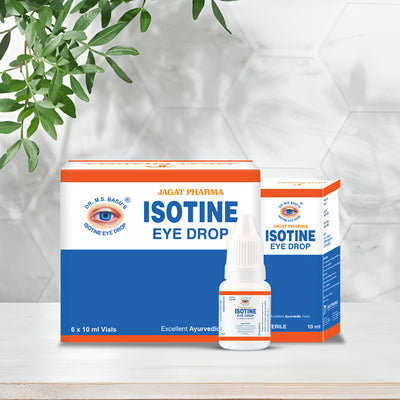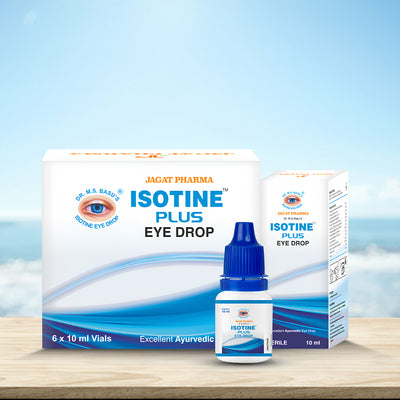
Pupil of the Eye, Its Function & Role
Human vision is one of nature's miracles, and the eye itself has its core, called the pupil, which is so small yet vital to our vision. We should talk about the pupil, what it does, and how to maintain the pupil's health in general as well as tips through Ayurveda.
What is a Pupil?
The pupil is the dark, round opening in the middle of your eye, surrounded by the colored part called the iris. It acts like a camera's aperture, adjusting its size to let in just the right amount of light for clear vision.
Function of Pupil in Human Eye
The pupil is the light controller of the eye, cooperating with the iris muscles to control how much light can enter into the eye: Let's know the function of the pupil in the human eye.
The pupil co-operates with the iris muscles:
- When light is bright, the pupil contracts to reduce the quantity of light entering into the eye.
- When light is dim, it dilates to increase the quantity of light into the eye.
This auto-regulation guarantees that the retina at the back of the eye receives just the right amount of light to optimize vision.
Role of Pupil in Vision
The pupil is vital to seeing clearly and focusing well on objects:
- Controls the Amount of Light: Through regulation of its size, the pupil prevents the retina from receiving too much light in brightness or from starving it of light in darkness.
- Sharpens Focus: Working with other parts of the eye helps generate a sharp image of what we see.
- Detects Environmental Changes: The pupil's responsiveness reflects the brain's overall health, as an indicator of neurological well-being.
Tests to Examine Pupil Health
Regular eye check-ups can assess the health of your pupils. Some common tests include:
1. Pupillary Light Reflex Test: This test examines how your pupil reacts to light by shining a light into your eye. The healthy pupil should constrict in response to light.
2. Swinging Flashlight Test: A flashlight is moved between your eyes to see if both pupils react the same way. It helps find problems with the nerves that connect your eyes and brain.
3. Accommodation Test: This test is used to determine the adaptation of your pupils when you focus on an object far away and then a close object. It depicts the capability of your eyes for focusing.
4. Slit-Lamp Examination: It's used with a special microscope and light to examine closely the pupil, iris, and other parts of your eye. It helps identify the injury or disease.
5. Dilation Test: Eye drops are used to make your pupils bigger so the doctor can see the back of your eye, like the retina, more clearly to check for any issues.
These tests help diagnose conditions like anisocoria (unequal pupil sizes), optic nerve damage, or iris abnormalities.
Ayurvedic Practices for Healthy Pupils
Ayurveda, the old Indian healing system, strongly emphasizes holistic methods of maintaining pupils' and the entire eye's health. The simple ones are:
1. Triphala Eye Wash: Rinse your eyes with a solution made from Triphala (a blend of three fruits). It helps cleanse and rejuvenate the eyes.
2. Ghee Massage: Apply warm, pure cow’s ghee around the eyes to nourish and improve circulation.
3. Palming: Rub your palms together to generate warmth, then place them gently over closed eyes. This relaxes the eye muscles and relieves strain.
4. Diet for Eye Health: Take foods high in Vitamin A (carrots, spinach, mangoes). Add herbs like Amalaki (Indian gooseberry) and Ashwagandha for improved functioning of the eyes.
5. Avoid Excess Screen Time: Reduce blue light exposure through screens as this can cause pupils to become strained. Apply Ayurvedic blue light-blocking eye drops if necessary.
6. Daily Eye Exercises Daily eye exercises may include an easy shift between near and far objects to strengthen the muscles responsible for eyes.
Isotine Eye Drops for Healthy Eyes
Isotine Eye Drops is a reliable Ayurvedic preparation prepared from active herbal ingredients like Palash, Apamarg, Punarnava, and Tuth Bhasma. These active ingredients will enhance the health of your eyes and help to counter various problems such as conjunctivitis, redness, eye fatigue, night blindness, and weak vision.
Using Isotine Eye Drops regularly improves blood circulation in the eyes, reduces oxidative stress, and nourishes delicate eye tissues. Its Ayurvedic formulation provides a safe and natural alternative than conventional eye treatments, promoting better vision and overall eye health.
Suitable for all age groups, thus can be relied upon for both children and adults to be healthy-eyed. Whether seeking eye drops for tired eyes or willing to improve vision, Isotine Eye Drops are your natural eye care solutions.
Conclusion
Though pupils are small, they do play a very important role for vision & overall eye health. Regular check-ups and adoption of Ayurvedic practices will ensure that your pupils remain healthy and function at their best. The pupil is a very important part of our eyes, which allows us to see clearly and adjust to light. Proper care for it is crucial for good vision and general eye health. Regular eye check-ups, Ayurvedic practices such as Triphala eye wash and ghee massage, and the use of Isotine Eye Drops can help keep your eyes healthy. Eat a balanced diet, exercise simple eyes, and limit screen time to protect your eyes and enjoy better vision!


